- Home
- Bertolt Brecht
Bertolt Brecht: Mutter Courage und ihre Kinder 4 Page 3
Bertolt Brecht: Mutter Courage und ihre Kinder 4 Read online
Page 3
A mutual friend with whom Reyher discussed his adaptation told Brecht that it ‘has a good chance of being a “hit” on Broadway’:
The scene that he read to me was so American, and the plan for the play has been worked out in such a way that the most sentimental viewer would listen and be captivated.
Among the suggested titles for this version were The Devil’s Opera and The Devil’s Sunday. It was never produced, possibly because Brecht failed to sign the contract which Reyher sent him.
Once war had broken out in Europe nothing more was heard of this scheme, and the play then lay on the shelf until Brecht and his family arrived in California in July 1941. By then the Russians too were at war and criticism of the Nazis was no longer denied them by the Soviet–German pact. Promptly the former published a thirteen-scene version of the play under the Germany – an Atrocity Story title, followed in 1942 by an English translation called (for the first time in public) Fear and Misery of the Third Reich. That same year, at Alma-Ata, Pudovkin filmed The Murderers Are on Their Way, based on ‘One big family’, ‘Winter aid’, ‘The chalk cross’, ‘The spy’ and ‘Job creation’; though the result was never released, on the grounds (says Jay Leyda) that its depiction of the Germans was not savage enough. Brecht for his part straightway began once again trying to promote the play in the United States. To H.R. Hays, his first wholly American translator, he wrote that he should try to get hold of a script, since this seemed to offer the best prospects of all his work. To Piscator he proposed it as a teaching exercise for his expected attachment (never realised) to his old ally’s Dramatic Workshop at the New School. His letter concluded: ‘Of course it would require collaboration. You yourself would have to collaborate. Please write me what you think.’
It was not till the summer of 1942 that any such schemes began to look serious. Then Berthold Viertel staged four of the original Angst scenes for an anti-Nazi group called Die Tribüne in the Fraternal Clubhouse in New York, while Max Reinhardt himself also thought of producing the play. This stimulated Brecht to devise a new wartime framework for the scenes, which he described in his journal as
a kind of PRIVATE LIFE OF THE MASTER RACE. one could put on stage the classic blitzkrieg lorry containing the third reich’s soldiers in their steel helmets bringing europe the new order, which the scenes proper would show operating in germany. the lorry would be treated in ballad style, to a barbaric horst-wessel march [the Nazi anthem] simultaneously sentimental and disgusting.
Though Reinhardt’s interest petered out along with his scheme to take over a New York theatre, Brecht completed the framework and evidently passed the result on to Piscator. For in the winter of 1942/43 Piscator was already making plans to stage this version at the Dramatic Workshop’s semi-professional Studio Theatre, in a translation which Hays was commissioned to make. Once again the project fell through, this time because Brecht allowed Eric Bentley simultaneously to translate the play in apparent competition with Hays. Hays cried off and Bentley went ahead.
Then in the spring of 1945, with the war on the point of ending, Piscator made what on the face of it should have been the most serious of the various proposals for an American staging of the play. This was for a production off Broadway under the sponsorship of the CIO unions. Brecht, who had already licensed a first performance of the new version by the university theatre at Berkeley, was prepared to agree, this time specifying his conditions as ‘a very good cast’ and an ‘excellent performance’. The translation in both cases was to be Bentley’s, now equipped with a new scene, the ‘Peat-bog soldiers’, written in New York largely by Elisabeth Hauptmann (who was to get 17 per cent of the royalties). Eisler too was drawn in to compose the framework choruses, the original interscene verses having been cut; these were restored in the published version that same year. The ‘very good cast’ consisted of what Brecht described as émigrés and Piscator pupils, the former including most notably the Bassermanns, an elderly couple of great eminence in the German theatre who however had never established themselves on the English-language stage and were not to do so now. Three weeks before the opening Brecht himself arrived from California, immediately rejected the introductory scene which Piscator wanted to add – a quasi-informal discussion of dictatorship and democracy in the light of the German surrender on 7/8 May – and threatened to withdraw the rights. Piscator thereupon resigned and was replaced by Berthold Viertel, who had also been in the market for the play earlier. The performance was beyond rescue – according to Brecht the budget had only been $6000 – and it was devastatingly panned by George Jean Nathan and other critics. ‘A terrible failure’, Eisler later called it. ‘Brecht wasn’t unhappy, but he was embarrassed.’
Somewhat confusingly, American critics even today refer to the original play by the title of this wartime adaptation, which was already outdated by the time of its performance. This is probably because for nearly forty years it was the only published text available in English. In fact the play’s whole history, as outlined so far, has meant that Brecht in effect provided us with two distinct works reflecting his relationships – both theatrical and political – with two very different parts of the world. For we now have on the one hand The Private Life of the Master Race, a quite closely woven sequence of scenes in three acts presenting the early years of the Nazi regime from the imagined point of view of a victorious army which has been turned back at Stalingrad. This, though far less crassly commercial than Reyher’s The Devil’s Sunday, was certainly devised with American professional production in view and following discussion with Clifford Odets and other Hollywood friends; the title itself smacks of American journalism, and even though Brecht himself may have devised it he virtually never used it in German. And then on the other hand we have the loose assortment of scenes designed for German émigré performance – part professional, part amateur – often on the most cheese-paring scale, from which the American version was itself adapted. This do-it-yourself theatrical kit, whose German text – the standard one in that language – was the source of 99%, The Murderers Are on Their Way and other topical selections, evolved more or less directly from Comintern policy, vintage 1935, and was aimed mainly at politically sympathetic audiences. While it may be remoter from ourselves than The Private Life, both chronologically and in terms of theatrical tradition, it is more modern in form and very much closer to the events portrayed.
* * *
If the play’s ambiguous career makes Fear and Misery something of a puzzle for the modern director, particularly in the English-speaking world, this is only secondary to the ambiguity of its original form. Particularly in Eastern Europe, critics have tended to link it with Carrar as constituting Brecht’s most ‘Socialist Realist’ works in the old Stalinist sense: that is to say, naturalistic in form and immediately political in content. Carrar indeed, in the twenty years following Brecht’s return to Europe after the war, was his most effective passport to acceptability in the Communist theatre; during that time, as Claude Hill has pointed out, it had more than twice as many performances in East Germany as any other of his plays, while that country’s cheap Reclam edition, starting with a printing of 50,000 copies in 1961, had reprinted sixteen times by 1977. But with Fear and Misery of the Third Reich the position – reflected in its much less frequent production – is rather different, because although the individual scenes are often naturalistic they are generally much terser and more sketch-like, while the overall construction is not naturalistic at all. Hence Brecht’s comments when Lukács welcomed ‘The spy’ on its publication in Das Wort ‘as though I were a sinner entering the bosom of the Salvation Army’:
he has failed to notice the montage of 27 scenes and the fact that it is just a table of gests: the gest of keeping silent, of looking over one’s shoulder, of being frightened and so on: gestics under dictatorship…. the montage which he so decries originated in dudow’s letters asking for something for the little proletarian company in paris. it shows how it is the proletarian exiled theatre tha
t keeps theatre going, at a time when in moscow the former leader of a berlin agitprop group, maxim vallentin, has gone over to the bourgeois theatre
– which is Brecht’s heretical way of describing the officially-approved Stanislavsky method.
The ‘epic’ aspect of this play, in other words, can be seen not only in the coolness of the writing (by comparison with that of Carrar) but first and foremost in the stringing-together of the scenes on a long processional ballad, itself comparable with several other characteristic Brecht poems, ranging from ‘The Legend of the Dead Soldier’ (1918) to ‘The Anachronistic Procession’ (1947). The actual order of those scenes as printed is not conceived in terms of ‘acts’ or ‘parts’ but simply chronological: what moves them relentlessly past us, in any order one chooses, is the regular rhythm of the linking stanzas. Brecht himself suggested to Piscator in 1938 that he might stage them by interspersing documentary material – presumably projections – ‘in the style of Goya’s etchings on the Civil War’; but really the analogy with The Disasters of War is much closer than that, because it is the scenes themselves that are the terrible images, which the stanzas seem to caption much as do Goya’s chillingly laconic titles. ‘The whole thing must be played straight through,’ he wrote on another occasion, ‘possibly beneath a forest of illuminated swastika flags, with a ballad interspersed.’ Max Reinhardt for his part was reminded of Büchner’s Woyzeck, evidently by the brevity of the scenes. Benjamin saw them as providing ‘an entire repertoire for the stage’ and thought that when published – something that he never lived to see – they would read like Karl Kraus’s The Last Days of Mankind, that enormous film-like panorama of Austria in the First World War.
Unfortunately Brecht for some reason never directed a production himself, and it was only after his death that the Berliner Ensemble presented some half-dozen scenes in a slow-moving production by five of the younger directors. Since returning from America he seems to have seen the play no longer as a work to be staged in its own right but more as a necessary prelude to any performance of The Resistible Rise of Arturo Ui – that other, much more oblique and superficial critique of the Nazis which, unlike Fear and Misery, really had been written for the American stage and conceived in largely American terms, yet never was seen by an American audience while he lived. It was almost as if he felt that the earlier play presented the facts of Nazism while the latter could only offer a mocking commentary unintelligible to those who had not yet faced them; and meanwhile was hesitant to produce either till more time had elapsed. Having seen neither Ernst Ginsberg’s production of January 1947 (on a red platform with a minimal setting by Caspar Neher) nor the (East) Berlin production at the Deutsches Theater a year later, he was still perhaps inhibited by the failure of The Private Life, and after that had made no further attempt to update the original play. Yet there is a powerful account of the Basel production by the then thirty-five-year-old Max Frisch, who contrasted Brecht’s reticent, low-level view of the Third Reich in the 1930s with Carl Zuckmayer’s far more successful The Devil’s General ‘which has relieved so many of us. Brecht doesn’t give this relief.’
A friend told me he felt that everything Brecht shows us here is more or less harmless by comparison with what came later. Perhaps this is its greatest strength: we know the results, what we are looking for is the beginnings.
Written several months before Frisch met Brecht, this is an extraordinarily perceptive verdict for the time. And it is even more clearly true today. For by now we have been stunned into insensibility by the continued fictional and semi-fictional regurgitation of ‘the results’, to a point where pornography starts to take over and neo-Fascists become almost flattered by the scale of the Nazi crimes. With the normal imagination no longer able to relate such things to our common humanity, use of the word ‘Fascism’ has largely degenerated into nonsense, while dangerously few are able to distinguish symptoms of real Fascism when they occur. We are in short in a situation where some understanding of ‘the beginnings’ of the great German tragedy are urgently needed if the all-important links between petty everyday actions and outsize human atrocities are not to escape our grasp. What Brecht can do for us here is to take us back to the pre-Auschwitz phase of Hitler’s reign, when many in the West considered that the German dictator was leading his country out of chaos, and viewed any incidental excesses as excusable in the fight against Communism. This is a case where the wisdom of hindsight vastly strengthens a play, because unlike the audience of 1938 we know what all the small-scale sneaking, lying and creeping eventually led to; we have looked at the end of the story, just as Brecht’s notion of epic theatre demands that we should. And so there is no suspense, only inexorable demonstration.
Today this can grip audiences as the contrived wartime version could not. All that perhaps needs changing in the original conception of the play is the prologue with its image of ‘The German marchpast’, the parade of a nation going to war, and the title with its allusion to a Third Reich now barely known except to those steeped in the historical background. As for the earlier objections by Dudow and others that Brecht’s picture of low-level Nazi life is too depressing and not ‘positive’ enough, they can now be seen to be very wide of the mark, so wide indeed that the optimistic ‘No!’ of the final scene sounds to us like wishful thinking, inconsistent with Brecht’s ruthlessly critical approach. It is this approach above all that has to be maintained, whatever the selection of scenes chosen, and it depends (as Brecht said) on the sharpness of the portrayal, which in turn is a function of the actors’ abilities, and the momentum with which the scenes follow one another. Once this tightness and drive can be achieved the scenes will have the same qualities as Frisch saw in them; that is, they will seem not like reportage but like carefully observed and purposefully formed extracts from life; what the Swiss writer termed ‘a revue for the memory’.
If mankind had a memory surely things would start to improve? We would either shoot ourselves or change. Brecht hopes the latter. Hence the sober way in which he speaks to us, without ever being carried away or taking refuge in that vagueness which often masquerades as poetry; his poetry is his seriousness, his love of mankind. And his beauty, I’d say, lies in the dignity of his approach.
It can be no minor or secondary work that inspires such a tribute as this from a fellow-artist. Nor can it be ephemeral so long as the death camps haunt our mind.
* * *
The Trial of Lucullus has a mixed ancestry. It was written soon after Mother Courage in the first weeks of the Second World War, and it showed the common people judging a successful military commander who was overweeningly confident of his great reputation. (We too got to know some of these.) But Brecht did not situate his characters in his own world, where Hitler had at last launched his expected assault on his neighbours after making a pact with the Russians who had been trusted to oppose him. Rather he went back to classical times, and particularly to the Roman history which he had been studying. His unfinished play about Julius Caesar had developed around 1937 into an equally unfinished novel about Caesar’s business affairs on which he was still working; his story ‘Lucullus’s Trophies’, which we include in our notes, was written some six months before the war, and points the way interestingly towards the Lucretian (hexameter) version of the Communist Manifesto which he would complete in 1945. Now he made Lucullus the centre of a ‘Hörspiel’ or radio play somewhat in the tradition of the ‘Lehrstücke’ of his last Berlin years. And in making an opera for a very different Germany after the war it would suffer a sea-change more notorious than any other transformation of his often variable works.
The radio play was intended to be performed by Stockholm radio with music by Hilding Rosenberg. It was accepted, but the plan fell through. Then it simmered in silence until the spring of 1940, when the Brechts moved from Sweden to Finland as the German pressure on the former increased. Curt Reiss, the Swiss publisher who represented Brecht, had placed the work with the Swiss radio Beromünster, who
broadcast it from their Berne studio on 12 May under the title Lucullus vor Gericht; it had no music. This was two days after the invasion of Belgium and Holland, and the family spent another year with Finnish friends before managing to leave via the USSR and catch one of the last boats from Vladivostok to California. During that time Mother Courage, written in 1939 but not performed, had its première at the Zurich Schauspielhaus (19 April 1941, two months before the German invasion of Russia). Away in the United States the poet Hofmann Hays read Lucullus, probably at Hanns Eisler’s suggestion, and made a good translation.
Brecht had been invited by Piscator to teach at the New School in New York, where Eisler was directing the Rockefeller Film Music Project. However, on arriving in Los Angeles, where some of his guarantors and other friends were working, he chose to settle within the possibly lucrative (and frequently German-speaking) orbit of Hollywood. It was on a visit to New York in spring 1943, at a ‘Brecht evening’ with performers like Bergner and Peter Lorre, that he heard Paul Dessau sing a setting from St Joan of the Stockyards and decided to get him out to LA. This was the start of a new collaboration to supplement those with Weill and Eisler, both of whom were now too much in demand for other commissions. From Brecht’s point of view the main results were the music for Mother Courage and the German Miserere, but quite early on it seemed that Dessau was hoping also to compose an opera. Brecht and he certainly discussed The Trial of Lucullus, as well as a new project for an opera on the theme of Brecht’s ‘Marie Sanders’ song (October 1944). But the primary composer Brecht had in mind for Lucullus was Stravinsky, and Dessau’s role had to be that of an intermediary. He was, noted Brecht in his journal for 6 November 1944,
much less developed than eisler, and seems tied up in routine. modern music converts texts into prose, even verse texts, and then poeticises that prose. it poeticises it and at the same time makes it psychological. the rhythm is dissolved. (except with stravinsky and bartok.) for the epic theatre this is useless.

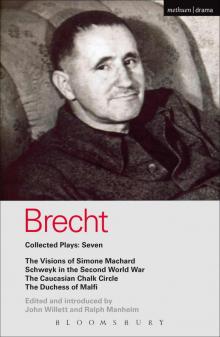 Bertolt Brecht: Mutter Courage und ihre Kinder 7
Bertolt Brecht: Mutter Courage und ihre Kinder 7 Bertolt Brecht
Bertolt Brecht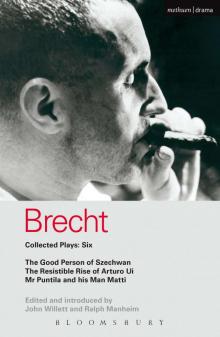 Bertolt Brecht: Mutter Courage und ihre Kinder 6
Bertolt Brecht: Mutter Courage und ihre Kinder 6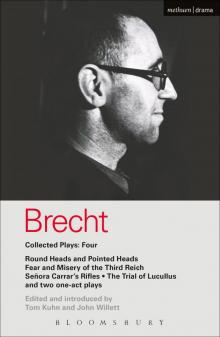 Bertolt Brecht: Mutter Courage und ihre Kinder 4
Bertolt Brecht: Mutter Courage und ihre Kinder 4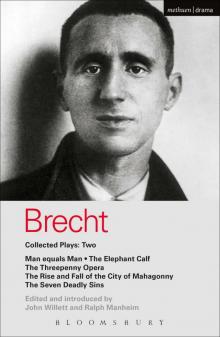 Bertolt Brecht: Mutter Courage und ihre Kinder 2
Bertolt Brecht: Mutter Courage und ihre Kinder 2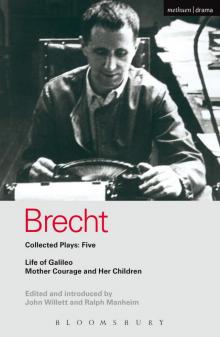 Bertolt Brecht: Mutter Courage und ihre Kinder 5
Bertolt Brecht: Mutter Courage und ihre Kinder 5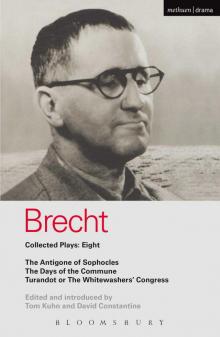 Collected Plays, Volume 4 (Bertolt Brecht: Plays, Poetry & Prose) 8
Collected Plays, Volume 4 (Bertolt Brecht: Plays, Poetry & Prose) 8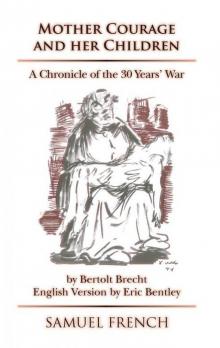 Mother Courage and Her Children
Mother Courage and Her Children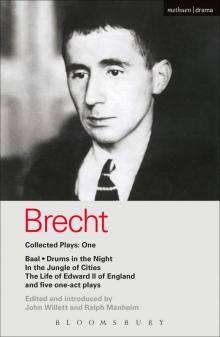 Bertolt Brecht: Mutter Courage und ihre Kinder 1
Bertolt Brecht: Mutter Courage und ihre Kinder 1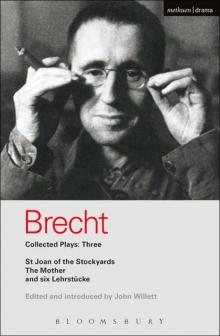 Brecht Collected Plays: 3: Lindbergh's Flight; The Baden-Baden Lesson on Consent; He Said Yes/He Said No; The Decision; The Mother; The Exception & the ... St Joan of the Stockyards (World Classics)
Brecht Collected Plays: 3: Lindbergh's Flight; The Baden-Baden Lesson on Consent; He Said Yes/He Said No; The Decision; The Mother; The Exception & the ... St Joan of the Stockyards (World Classics)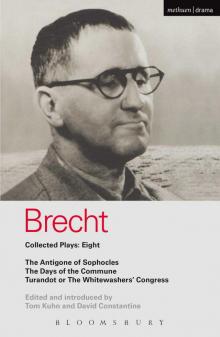 Brecht Plays 8: The Antigone of Sophocles; The Days of the Commune; Turandot or the Whitewasher's Congress: The Antigone of Sophocles , The Days of the Comm (World Classics)
Brecht Plays 8: The Antigone of Sophocles; The Days of the Commune; Turandot or the Whitewasher's Congress: The Antigone of Sophocles , The Days of the Comm (World Classics)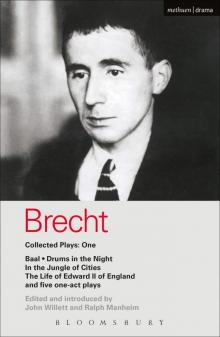 Brecht Collected Plays: 1: Baal; Drums in the Night; In the Jungle of Cities; Life of Edward II of England; & 5 One Act Plays: Baal , Drums in the Night , In the Jungle of Ci (World Classics)
Brecht Collected Plays: 1: Baal; Drums in the Night; In the Jungle of Cities; Life of Edward II of England; & 5 One Act Plays: Baal , Drums in the Night , In the Jungle of Ci (World Classics)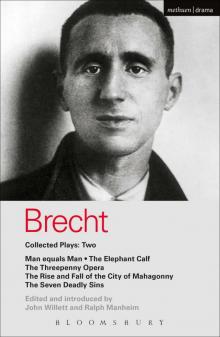 Brecht Collected Plays: 2: Man Equals Man; Elephant Calf; Threepenny Opera; Mahagonny; Seven Deadly Sins: Man Equals Man , Elephant Calf , Threepenny Ope (World Classics)
Brecht Collected Plays: 2: Man Equals Man; Elephant Calf; Threepenny Opera; Mahagonny; Seven Deadly Sins: Man Equals Man , Elephant Calf , Threepenny Ope (World Classics)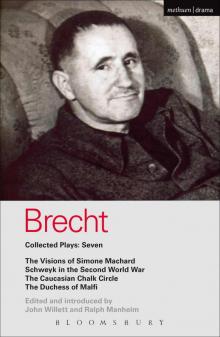 Brecht Collected Plays: 7: Visions of Simone Machard; Schweyk in the Second World War; Caucasian Chalk Circle; Duchess of Malfi (World Classics)
Brecht Collected Plays: 7: Visions of Simone Machard; Schweyk in the Second World War; Caucasian Chalk Circle; Duchess of Malfi (World Classics)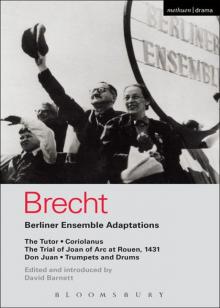 Berliner Ensemble Adaptations
Berliner Ensemble Adaptations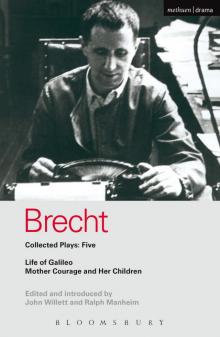 Brecht Collected Plays: 5: Life of Galileo; Mother Courage and Her Children (World Classics)
Brecht Collected Plays: 5: Life of Galileo; Mother Courage and Her Children (World Classics)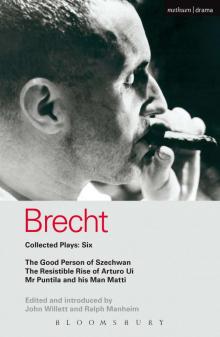 Brecht Collected Plays: 6: Good Person of Szechwan; The Resistible Rise of Arturo Ui; Mr Puntila and his Man Matti (World Classics)
Brecht Collected Plays: 6: Good Person of Szechwan; The Resistible Rise of Arturo Ui; Mr Puntila and his Man Matti (World Classics)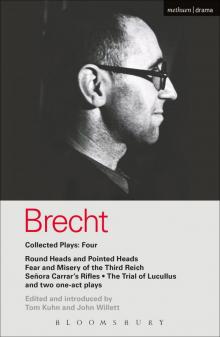 Brecht Collected Plays: 4: Round Heads & Pointed Heads; Fear & Misery of the Third Reich; Senora Carrar's Rifles; Trial of Lucullus; Dansen; How Much Is ... and Misery , Carr (World Classics)
Brecht Collected Plays: 4: Round Heads & Pointed Heads; Fear & Misery of the Third Reich; Senora Carrar's Rifles; Trial of Lucullus; Dansen; How Much Is ... and Misery , Carr (World Classics)